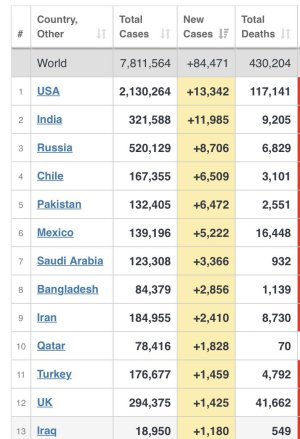French President Emmanuel Macron has said the country has "won its first victory" over the virus, and a number of restrictions will now be lifted.
In a televised speech to the nation, he said France would reopen its borders to travellers from the European Union from Monday.
Restaurants and cafes will also be able to reopen fully, not only outdoors. Schools, except for high schools, will open from 22 June. Macron however warned the virus could still return.
He also said the disease had exposed France’s "shortcomings" - and that the country had been overly dependent on global supply chains.
Coronavirus: France announces significant lifting of restrictions
French President Emmanuel Macron has announced a number of coronavirus restrictions are being lifted.
Cafes and restaurants are reopening across France and travel to other European countries will be allowed.
People will also be able to visit family members in retirement homes, which have been hit particularly hard by the Covid-19 outbreak.
Germany, Belgium, Croatia and Switzerland are fully reopening borders with EU countries on Monday.
Travellers from the UK will be able to visit these four countries without quarantine or restrictions upon arrival, though they still face quarantine on return to the UK.
Meanwhile, UK and Spanish travellers to France are being asked to go into two-week quarantine upon arrival there.
What do the changes mean for France?
More than 29,400 people have died of coronavirus in France, and the country has had almost 194,000 confirmed cases - although the number of new cases has slowed markedly in recent days.
President Macron first imposed a strict lockdown on 17 March. These remained in place until 11 May, when the country began to cautiously ease restrictions.
In a televised address on Sunday, Mr Macron said France had won its "first victory" but he warned the virus could return.
"As soon as tomorrow, we will be able to turn the page on this first chapter across all our territory," he said.
Restaurants, hotels and cafés were allowed to reopen in many parts of France earlier this month - provided distancing rules were observed.
Mr Macron confirmed that from Monday, this would also happen in the Paris region, which recorded the highest number of cases in the country.
He also said that schools would reopen from 22 June - except for high schools.
However, the president added, "this does not mean that the virus has gone and that we can completely drop our guard. The summer of 2020 will be a summer unlike any other and we will need to watch the evolution of the epidemic to be prepared in case it comes back with renewed strength."
Mr Macron also confirmed that the second round of municipal elections, originally scheduled for March, would go ahead on 28 June.
But, he added, mass gatherings would need to remain "tightly controlled" because they were "the main occasions for spreading the virus".
All of mainland France will now be in the "green zone" virus alert level while the overseas territories of Mayotte and French Guiana will remain at the "orange" alert level. Both territories still have high numbers of cases, which are threatening to overwhelm their hospital systems.
https://www.bbc.com/news/world-europe-52978327





